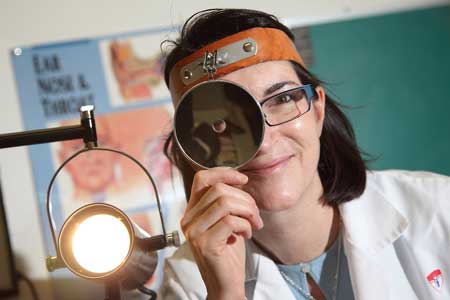
By Jim Hynes
Serious musicians go to great lengths to protect and maintain their instruments. But because it’s a part of their bodies, one they use for hours every day even when they’re not making music, singers sometimes neglect their only instrument – the voice and the vocal cords that produce it.
Dr. Françoise Chagnon and her colleagues in the MUHC Voice Lab have been focussing on the care and treatment of the human voice since 1991. Today, the Lab evaluates and treats some 3,000 patients a year, including professional singers and other performers, but also people like announcers and even telemarketers – people who use their voices to make a living. Chagnon, current director Dr. Karen Kost, and recent addition Dr. Jonathan Young now operate the Lab, which is equipped with special equipment that allows them to look at vocal cords and do special analysis of their functioning.
“At the same time we were developing an interest in the science of voice disorders from a medical point of view back in the early ’90s, there was a trend in vocal pedagogy, in music schools and opera programs, to teach how to develop the singing voice based on evidence or organic findings as opposed to strictly teaching on the basis of imitation,” said Chagnon, the lab’s founder, first director and a staff member at the Montreal General Hospital’s Department of Otolaryngology since 1987. “There was a lot of interest in the anatomy and the physiology and the functioning of the human voice and how to develop it.”
Dear Abby of the singing set
That common interest has been a boon to the vocal health of young singers, says Chagnon, who once wrote a column called “Ask the Throat Doctor” in the classical music magazine La Scena Musicale.
“We had some very forward-thinking professors back then, like Bill Neill (former director of Vocal Studies for the then Faculty of Music), Winston Purdy and many others in the Opera program who had an interest in the vocal health of their students.”
Now, Chagnon says, properly trained singers are usually better off than non-singers when it comes to vocal problems.
“It’s the ones with no training that get into trouble. But if we look at students from university programs and opera programs, they’re coached well enough that they usually don’t run into very serious problems.”
In fact, it’s now become standard procedure to have people who want to take up singing come to the Lab to have a basic examination of their vocal cords and to look for any other ear, nose and throat problems.
“They have the same problems as a lot of other people do – sinusitis, allergies, all these things play into the efficiency of the voice. So we tend to these common little problems and oftentimes will also educate the student about vocal cords and how they function, how you can control the mechanism of voicing and how it’s related to the ears, nose and throat and even the rest of the body, “Chagnon said. “People have to first have an understanding on how they produce their voice. It doesn’t just come out of your body by itself.”
Callused cords
Singers can permanently damage their voices, although it’s quite rare. When they do have problems, environmental factors like illness and allergies are most often to blame. Poor digestion and acid reflux, which is more and more prevalent in young and otherwise healthy adults, can also irritate the vocal cords, Chagnon says. The good news is that rest and behaviour modification (followed up by the learning of proper vocal techniques) often take care of the more minor vocal problems.
Then there’s injury and trauma leading to soft tissue injuries on the surface of the vocal cords. This ranges from degrees of swelling to bruising and can sometimes require more serious intervention like surgery.
“The vocal cords are soft, fleshy little structures, and if you bang on them too much and for too long, you can get some bruising,” Chagnon said.
Persistent abuse of the vocal cords can lead to the build up of nodules, which look like little blisters on the vocal cords, but can harden like calluses if the behaviour that caused them continues.
Singers and non-singers alike can avoid vocal disorders through good vocal hygiene. Stay hydrated, don’t smoke, eat well, don’t scream and give your voice a break when it needs it, voice experts say, and it will be just fine.
“I think the biggest thing people, especially singers, need to understand is the importance of voice rest, Chagnon said. “You shouldn’t use your voice with impunity all day and all night any more than you would your legs. After a while you’d feel tired and say, ‘I have to sit down’. But people are using the muscles in their voice box beyond what they are capable of. We need to listen to our inner voice too, the one that’s saying ‘I’m tired’.”
